 1990
1990

“Angel Terminators”
(1990)
(Grandwell Film Productions, Dir. Wai Lit)
This excellent GWG movie pits a fine dramatic
and martial arts performance by Sharon Yeung Pan-Pan as an HK policewoman
against an equally robust Japanese femme fatale played by Michiko in a
supporting role. Other fine supporting actors include Kara Hui Ying-Hung
as Pan-Pan’s partner, and an array of HK screen “heavies” on the other
side – including Mark Houghton and Dick Wei.
The competing forces collide in a series of
brutally well directed fight sequences. Sharon Yeung Pan-Pan and
Kara Hui Ying-Hung are well matched as a pair of lethally effective detectives,
pitting both brains and outstanding martial arts skills against various
criminals. Their screen chemistry throughout this action-filled movie
is excellent. As an additional treat Kara Hui delivers not only her
martial arts ability but also her magnificent range of facial expressions.
 Michiko arrives at the airport wearing a kimono
– one of a number of reinforcements for a gang takeover war. She
quickly changes into skin-tight leather or vinyl, and simply looks great.
Other elements of costume fetishism are provided by Carrie Ng and other
female supporting actors who appear in smart frocks or cocktail dresses,
contrasting with Pan-Pan’s rather butch slacks and jacket.
Michiko arrives at the airport wearing a kimono
– one of a number of reinforcements for a gang takeover war. She
quickly changes into skin-tight leather or vinyl, and simply looks great.
Other elements of costume fetishism are provided by Carrie Ng and other
female supporting actors who appear in smart frocks or cocktail dresses,
contrasting with Pan-Pan’s rather butch slacks and jacket.
The gang ambushes a big drug deal during which
Michiko totes a sub-machine gun while kicking strongly. Later she
appears coldly predatory at a confrontation between rival gang members,
like an obedient attack dog. Immobile yet vigilant, she suddenly
“de-fangs the snake,” crippling her boss’s rival with an inverted tanto
blade sliced across his forearm as he tries to draw a weapon, then cutting
his throat. It’s a chillingly well-filmed moment, as his body is
dragged away. There are plenty of narrowed eyes and menacing looks.
 As the police close in on the gang, Michiko’s
male partner (Chui Chung San) is killed by Pan-Pan. Michiko’s character
cuts off her little finger and swears revenge. This opportunity comes
in the form of a trap set for Carrie Ng’s husband – a police officer corrupted
by gambling debt. When he is trailed by Pan-Pan, Michiko springs
the trap. He is killed and Pan-Pan is captured, then blamed for his
murder. After Carrie Ng’s character unsuccessfully attempts revenge,
both women are held by Michiko in a private dungeon. Carrie Ng’s
character endures a horrific assault by Michiko’s boss (Kenneth Tsang),
then is stabbed to death in the neck by Michiko. Pan-Pan’s policewoman
has been reduced to a drug-addled wreck by forcible injection.
As the police close in on the gang, Michiko’s
male partner (Chui Chung San) is killed by Pan-Pan. Michiko’s character
cuts off her little finger and swears revenge. This opportunity comes
in the form of a trap set for Carrie Ng’s husband – a police officer corrupted
by gambling debt. When he is trailed by Pan-Pan, Michiko springs
the trap. He is killed and Pan-Pan is captured, then blamed for his
murder. After Carrie Ng’s character unsuccessfully attempts revenge,
both women are held by Michiko in a private dungeon. Carrie Ng’s
character endures a horrific assault by Michiko’s boss (Kenneth Tsang),
then is stabbed to death in the neck by Michiko. Pan-Pan’s policewoman
has been reduced to a drug-addled wreck by forcible injection.
 Michiko’s evil character eventually meets her
end in a brief fight with a recovered Pan-Pan who has eventually been found
by her partner, Kara. The two then set their sights on the gang boss.
Although a supporting role, Michiko’s character acting in this film is
truly chilling, conveying a twisted mix of propriety and criminal menace.
The rest of the action and acting is just as good. Darkly vicious,
this film is not compromised by comic elements.
Michiko’s evil character eventually meets her
end in a brief fight with a recovered Pan-Pan who has eventually been found
by her partner, Kara. The two then set their sights on the gang boss.
Although a supporting role, Michiko’s character acting in this film is
truly chilling, conveying a twisted mix of propriety and criminal menace.
The rest of the action and acting is just as good. Darkly vicious,
this film is not compromised by comic elements.
A2.5, B3, C4, D3, E4, F4 (20.5). Highly
Recommended
“Dragon Fighter, The”
(aka “Hard To Die,” 1990)
(Jia’s Motion Picture HK Co., Dir. Jimmy Wong)
The agendas of three women intersect bloodily
as they set their sights on Mr. David Lung’s (Eddy Ko Hung) criminal organization.
Sibelle Hu (“Julie”) in yet another policewoman role is seeking redress
for the drug addiction, then murder of her father. Carrie Ng plays
“Jessica,” an undercover agent who poses as “Bill’s” (Francis Ng) girlfriend,
while Michiko is a Japanese seeking revenge for the murder of her father.
 Their paths cross those of the male leads.
Alex Man (“Andy”) overacts as a petty drug dealer who rescues then falls
for Michiko, after tangling repeatedly with his nemesis Sibelle Hu.
Alex Fong plays a contract killer from the USA who becomes a rival to Bill
for Jessica.
Their paths cross those of the male leads.
Alex Man (“Andy”) overacts as a petty drug dealer who rescues then falls
for Michiko, after tangling repeatedly with his nemesis Sibelle Hu.
Alex Fong plays a contract killer from the USA who becomes a rival to Bill
for Jessica.
 From the opening scene in which a demented looking
Michiko lets fly with a sub-machine gun while yelling “Bastard” in a crowded
restaurant, the action is plentiful, albeit not particularly sophisticated.
Mark Houghton is killed off early as a visiting racketeer. Michiko
later practices with a rocket launcher, taking on Lung’s gang and destroying
a valuable shipment. She displays some powerful kicking and punching,
but gains height by climbing on objects and seems to follow relatively
basic fight routines. As always, a close-up of her brief look of
satisfaction, framed by wet, slicked back hair, is rewarding.
From the opening scene in which a demented looking
Michiko lets fly with a sub-machine gun while yelling “Bastard” in a crowded
restaurant, the action is plentiful, albeit not particularly sophisticated.
Mark Houghton is killed off early as a visiting racketeer. Michiko
later practices with a rocket launcher, taking on Lung’s gang and destroying
a valuable shipment. She displays some powerful kicking and punching,
but gains height by climbing on objects and seems to follow relatively
basic fight routines. As always, a close-up of her brief look of
satisfaction, framed by wet, slicked back hair, is rewarding.
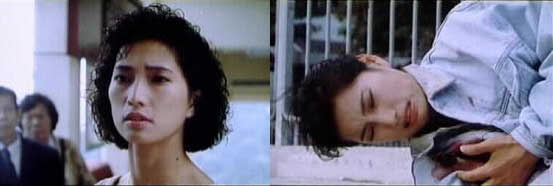 After Michiko is rescued from the sexual harassment
of two punks by Andy (Alex Man), she later seeks his assistance after she
is shot by the gang. Although referred to as “Jap girl,” sympathy
for Michiko’s character is developed when she cries while describing the
murder of her father by Lung’s gang.
After Michiko is rescued from the sexual harassment
of two punks by Andy (Alex Man), she later seeks his assistance after she
is shot by the gang. Although referred to as “Jap girl,” sympathy
for Michiko’s character is developed when she cries while describing the
murder of her father by Lung’s gang.
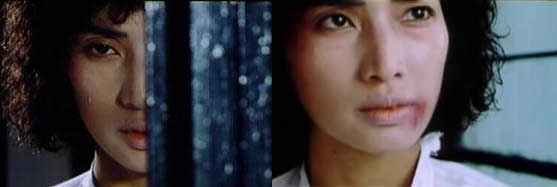 After Sibelle Hu’s father is killed when she refuses
a bribe, and Carrie Ng is discovered and shot – rescued by Alex Fong, the
stage is set for a final confrontation. The evidence Jessica (Carrie
Ng) has gathered is betrayed by Police corruption, and both Michiko and
Carrie Ng’s characters are killed in battle with the gang. Jessica
is impaled, while Michiko sacrifices herself to save Alex Man and Sibelle
Hu – finishing off her attackers with the last burst from an AK-47.
Following this, the final shootout at a container yard follows a predictable
course, and ends in an unconvincing car chase.
After Sibelle Hu’s father is killed when she refuses
a bribe, and Carrie Ng is discovered and shot – rescued by Alex Fong, the
stage is set for a final confrontation. The evidence Jessica (Carrie
Ng) has gathered is betrayed by Police corruption, and both Michiko and
Carrie Ng’s characters are killed in battle with the gang. Jessica
is impaled, while Michiko sacrifices herself to save Alex Man and Sibelle
Hu – finishing off her attackers with the last burst from an AK-47.
Following this, the final shootout at a container yard follows a predictable
course, and ends in an unconvincing car chase.
A2, B3.5, C3, D2.5, E3.5, F2 (16.5).
Recommended
“Magic Cop” (aka “Mr.
Vampire 5,” 1990)
(Movie Impact, Dir. Lai Da Wei, aka David Lai)
In an entertaining blend of sorcery, police
action comedy and good-natured repartee, “Fung Zee” (Lam Ching Ying) is
a Taoist cop called in to assist two HK detectives (Wilson Lam and Miu
Kiu Wai) solve an unusual case. A drug stakeout in a restaurant is
nearly derailed by a female zombie who drags one of the police into a nearly
fatal traffic accident. The investigation leads to a health club
where a male associate of the deceased, “Eddy” (Frankie Chan Chi Leung)
unwittingly leads the cops to the origin of this black magic.
 Michiko is a distinctively Japanese sorceress
who can use ice crystals implanted in her victims’ skulls to control their
bodies. She swiftly dispatches the muscular but naïve Eddy –
by symbolically choking a cat. He then becomes a zombie sent to hunt
down the pursuing cops. In a scene reminiscent of “The Terminator”
he bursts into a morgue. Along the way there are good-natured low-key
comic exchanges between Fung, the two investigating officers, Fung’s attractive
niece “Lin,” and the senior police officer “Ma” (Wu Ma). Further
tensions that enrich the plot include the friction between Taoism and science,
modernity and traditionalism, and old-fashioned romantic interest.
Michiko is a distinctively Japanese sorceress
who can use ice crystals implanted in her victims’ skulls to control their
bodies. She swiftly dispatches the muscular but naïve Eddy –
by symbolically choking a cat. He then becomes a zombie sent to hunt
down the pursuing cops. In a scene reminiscent of “The Terminator”
he bursts into a morgue. Along the way there are good-natured low-key
comic exchanges between Fung, the two investigating officers, Fung’s attractive
niece “Lin,” and the senior police officer “Ma” (Wu Ma). Further
tensions that enrich the plot include the friction between Taoism and science,
modernity and traditionalism, and old-fashioned romantic interest.
 Additional zest is added by Michiko’s strikingly
formal, ice-cold sorceress. Beautiful flowers are turned into lethal
weapons by her magic, slow-motion cascades of petals unleashing violent
forces. At one point Michiko slices through a sake jug with a single
hair plucked from her head. Despite her fanatical bodyguard (Billy
Chow), Michiko’s sorcery is ultimately no match for a Taoist mirror used
by Fung. In a rooftop duel in which he dodges magically flying tiles,
Fung causes the sorceress to look into the mirror. This instantly
strips away her beauty to reveal her true ugliness. The final confrontation
appears tongue-in-cheek. The demon is first blinded, then set on
fire. It can still hear, and the heroes must endure pain and indignity
in silence to avoid being detected.
Additional zest is added by Michiko’s strikingly
formal, ice-cold sorceress. Beautiful flowers are turned into lethal
weapons by her magic, slow-motion cascades of petals unleashing violent
forces. At one point Michiko slices through a sake jug with a single
hair plucked from her head. Despite her fanatical bodyguard (Billy
Chow), Michiko’s sorcery is ultimately no match for a Taoist mirror used
by Fung. In a rooftop duel in which he dodges magically flying tiles,
Fung causes the sorceress to look into the mirror. This instantly
strips away her beauty to reveal her true ugliness. The final confrontation
appears tongue-in-cheek. The demon is first blinded, then set on
fire. It can still hear, and the heroes must endure pain and indignity
in silence to avoid being detected.
 This part certainly expanded Michiko’s range of
casting, and hinted at potential in a popular genre beyond simple actioners.
Once again, being cast as a Japanese may have been limiting.
This part certainly expanded Michiko’s range of
casting, and hinted at potential in a popular genre beyond simple actioners.
Once again, being cast as a Japanese may have been limiting.

A2, B1, C3.5, D3, E3, F3 (15.5). Recommended
“Outlaw Brothers, The”
(1990)
(Gordon’s Film & Co. Ltd., Dir. Frankie
Chan)
How frustrating it must have been for Michiko
to literally stand passively on the set and watch fellow Japanese Yukari
Oshima deliver a virtuoso martial arts performance, demolishing Michiko’s
gang of gwailos – including Jeff Falcon, Mark Houghton and Vincent Lyn.
Michiko’s role is very much an expanded cameo as a scheming drug smuggler
seeking to conceal a shipment of drugs in a racecar. As insurance
she kidnaps and holds hostage the wife of the car’s driver (Sheila Chan),
who is also the sister of Frankie Chan’s car thief character. He,
in turn, is being investigated by Yukari Oshima’s undercover policewoman
character who is trailing exotic car thefts. She has evidently also
attempted to arrest Michiko’s drug smuggler. When the two of them
interact, the hostility flares.
 Michiko appears at the end of this actioner, strikingly
clad in a black dress and broad brimmed hat. Once again, she slaps
her men (Mark Houghton), as well as menacing her rivals with an M-16 with
grenade launcher attachment. At one point she appears to jump over
a speeding Porsche – a highly risky stunt if actually performed as it appears.
Michiko’s role is particularly constricted and mean. She is required
to stand relatively still or simply direct her men – a stereotypic villainess.
She ends up experiencing the indignity of being hog-tied. But, when
given a brief opportunity to kick Yukari, it looks real enough.
Michiko appears at the end of this actioner, strikingly
clad in a black dress and broad brimmed hat. Once again, she slaps
her men (Mark Houghton), as well as menacing her rivals with an M-16 with
grenade launcher attachment. At one point she appears to jump over
a speeding Porsche – a highly risky stunt if actually performed as it appears.
Michiko’s role is particularly constricted and mean. She is required
to stand relatively still or simply direct her men – a stereotypic villainess.
She ends up experiencing the indignity of being hog-tied. But, when
given a brief opportunity to kick Yukari, it looks real enough.

A2, B2.5, C2.5, D3, E4, F3 (17). Recommended
“Widow Warriors” (1989)
(Maverick Film Ltd., Dir. Wang Lung-Wai)
Relentlessly downbeat, this movie plunges into
a heart of darkness. Everyone fights. Almost everyone dies.
The action proceeds through three distinct phases, each yielding messages
about roles, expectations and loyalty. This is the kind of film in
which the heroine’s husband is shot, execution-style, on his knees by one
of his female in-laws. Other protagonists – women as well as men
– are shot, dropping into muddy pools or flopping, broken-backed, across
a traffic barrier. The heroes die or are maimed. Michiko (playing
a Japanese relative “Chieko”) is unceremoniously shot, her body dragged
away. Later her pale corpse is viewed in the morgue. Kara Hui
lies in hospital, bloody and paralyzed with a tube up her nose, vainly
trying to signal with her eyes. But no one understands the message.
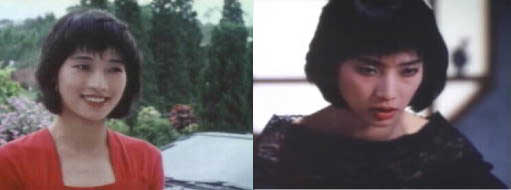 The plot initially tracks that of “The Godfather.”
An aging patriarch (Shek Kin) gathers his family while celebrating the
newfound legitimacy of his Triad business ventures. The threat of
rivals is fatally underestimated as he and his sons(Ken Lo, Phillip Chan,
Michael Chan) are gunned down in the first of three well-executed action
sequences. As in “The Godfather,” the grace and symbolism of Peking
Opera provide a jarring prelude to the imminent violence.
The plot initially tracks that of “The Godfather.”
An aging patriarch (Shek Kin) gathers his family while celebrating the
newfound legitimacy of his Triad business ventures. The threat of
rivals is fatally underestimated as he and his sons(Ken Lo, Phillip Chan,
Michael Chan) are gunned down in the first of three well-executed action
sequences. As in “The Godfather,” the grace and symbolism of Peking
Opera provide a jarring prelude to the imminent violence.
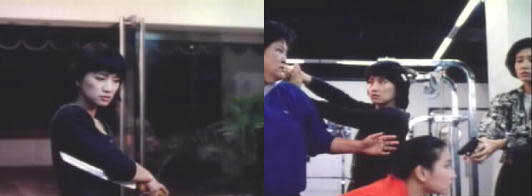 The survivors are all widows. To preserve
the family’s business and honor they strike back. Impulsive vengeance
leads Michiko, Kara and one of their sisters to their deaths. There
are some excellent martial arts sequences, during which Michiko – wielding
a shoto with an inverted grip – slices through a hapless (and innocent)
receptionist as well as several security personnel, then fights with the
principal assassin’s wife (Ha Chi-chun) in a private gymnasium. After
seeming victory, she and her sister-in-law are gunned down when they confront
the rival gang. It’s sudden and shockingly final. Kara witnesses
this and has a magnificent fight sequence, but she too is shot and paralyzed.
In the end, as the martial artists fail, it’s up to the least martial of
the surviving women (Elizabeth Lee) to orchestrate a bloodily brutal GWG
finale. This ends with one of them screaming while emptying a machine
gun clip into the leading bad guy - who’s wearing a white suit and lying
on the ground already wounded.
The survivors are all widows. To preserve
the family’s business and honor they strike back. Impulsive vengeance
leads Michiko, Kara and one of their sisters to their deaths. There
are some excellent martial arts sequences, during which Michiko – wielding
a shoto with an inverted grip – slices through a hapless (and innocent)
receptionist as well as several security personnel, then fights with the
principal assassin’s wife (Ha Chi-chun) in a private gymnasium. After
seeming victory, she and her sister-in-law are gunned down when they confront
the rival gang. It’s sudden and shockingly final. Kara witnesses
this and has a magnificent fight sequence, but she too is shot and paralyzed.
In the end, as the martial artists fail, it’s up to the least martial of
the surviving women (Elizabeth Lee) to orchestrate a bloodily brutal GWG
finale. This ends with one of them screaming while emptying a machine
gun clip into the leading bad guy - who’s wearing a white suit and lying
on the ground already wounded.
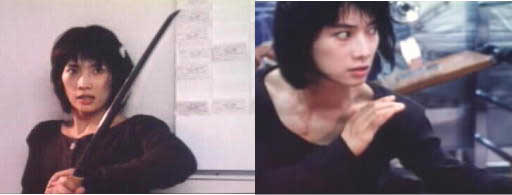 The former “chop-socky” martial arts star, director
Wang Lung-Wei serves up a plate of pain. The images fly as fast as
the bullets. The symbolism is subtle, yet powerful, as the least
martial women of the family clan use intelligence and cunning to prevail
where both martial arts and masculine bravura had failed. Once again
Michiko is explicitly cast as a Japanese – an outsider. Significantly,
she’s the one who, unthinking, recklessly drags her sisters-in-law into
a virtual suicide mission.
The former “chop-socky” martial arts star, director
Wang Lung-Wei serves up a plate of pain. The images fly as fast as
the bullets. The symbolism is subtle, yet powerful, as the least
martial women of the family clan use intelligence and cunning to prevail
where both martial arts and masculine bravura had failed. Once again
Michiko is explicitly cast as a Japanese – an outsider. Significantly,
she’s the one who, unthinking, recklessly drags her sisters-in-law into
a virtual suicide mission.
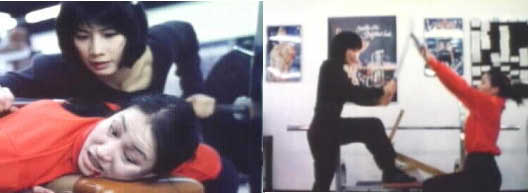 Michiko is very dressily attired for the family
reunion, displaying Japanese formality and “tatemae” (outward behavior).
The contrast between her formality and sudden recklessness is an interesting
counterpoint to the other, more expressive family members.
Michiko is very dressily attired for the family
reunion, displaying Japanese formality and “tatemae” (outward behavior).
The contrast between her formality and sudden recklessness is an interesting
counterpoint to the other, more expressive family members.
A2, B 4, C3, D3.5, E4, F4 (20.5). Highly
Recommended



















